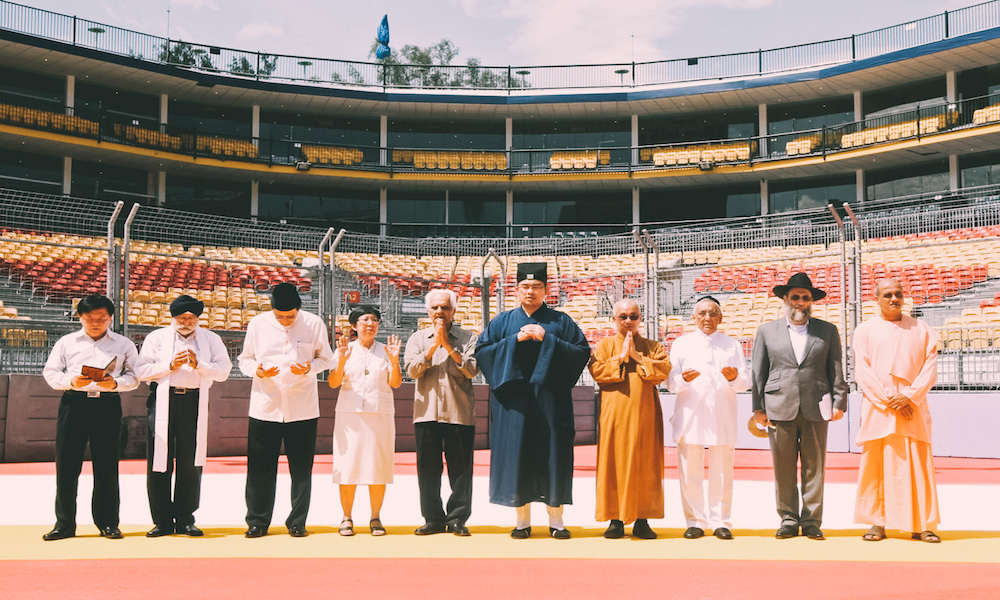by Rima Chakraborty – Follow @browngirlmag
![]()
The First Amendment was created in the USA by our Founding Fathers to grant to the people separation of church and state, that our individual religious pursuits would not be dictated by the government. It keeps reigns on religious imposition, but it does not reign in personal persecution, which can go unfettered.
I come from a multi-religious household. My sister and I were raised to be humanists first, and practitioners of a religion of our choice second. We do not expect others to pray when they come to our home, but we do not expect anyone to flagrantly disrespect our beliefs either.
Thus, to be chastised for not praying in a nonreligious setting was a new concept for me.
[Read More: Why Mosque Culture Needs to Change: An Open Letter to Masjid Aunties]
It was a cold, blustery day in October. My family was dropping off a middle-aged woman to her home. We went inside, as she offered us tea for dropping her off. We walked to the door as it neared time to leave the house and the woman asked everyone,
“Please come and give pranaam (obeisance) to thakur (god) before you leave.”
Initially, her children did not want to but then acquiesced after some cajoling from their mother. My mother, sister and I politely declined. The woman then proclaimed condescendingly to us as her children went to pray,
“One of the wives in our family is Christian; however, she is very respectful and always goes and gives pranaam.”
I pondered this sentence for a long time.
Religious freedom has been part of this country’s identity since its inception. Many of the Founding Fathers and their ancestors had left Europe due to religious persecution. This lady mentioned above opined what her idea of respect is. I would counter that the separation of church (i.e., religious institutions in general) and state started through the First Amendment due to people like her who expected others to follow suit in their religious beliefs.
The demographics of religion are changing in the USA. Recent studies show that the number of people who identify non-Christian and agnostic/atheist is increasing. The practices may be different, but the emotions and expectations are similar. Does one’s individual religious beliefs or in some cases, lack of belief, give them the right to impose that on others? Recently, a public business declined a business request due to personal religious beliefs. Is that constitutional? Would I expect someone who does not drink alcohol due to religious beliefs to work in a liquor store or grocery store and refuse to sell me alcohol?
[Read Related: Confronting White Supremacy in Christianity as a Christian South Asian]
This is further important to those of desi origin, as many of us come from countries where religious rights are not guaranteed. For example, both Bangladesh and India in their respective constitutions dictate freedom of religion. However, as the news shows us, there are countless examples of both these countries failing to protect the right to freedom of religion. Pakistan is much the same, although it has in its mix the Hudood Ordinances which further restrict religious freedom, as well. The United States Commission on International Religious Freedom lists tier 1 countries as the countries of most concern of violation of religious freedom and Pakistan is always on that list.
It is imperative that the readers of this magazine and those of us who are desi recognize the merits of religious freedom. Whether we were persecuted for our religious beliefs or lack of beliefs, we should realize this is a freedom not always available, although it is promised. The fact that many of the countries we emigrated from have “religious freedom” as part of their constitutions, but not as a practice, shows how important the practice is as opposed to unexecuted laws written down.
That practice starts at home. I would urge those who practice religion to be cognizant of those who do not or those who practice other religions. By forcing or expecting others to practice your religion, you are not letting those individuals exercise their basic First Amendment freedoms.






